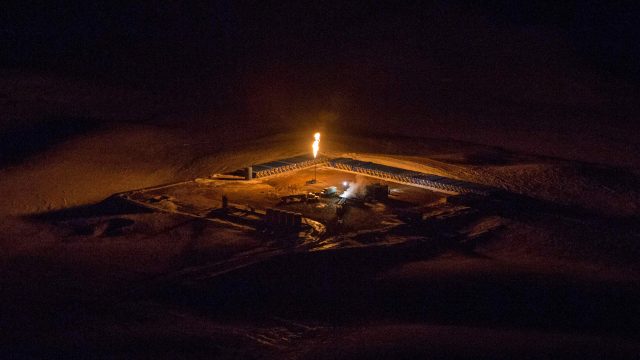Flaring Is Higher On Federal Lands, And Rep. Kevin Cramer Hopes To Fix It

Flaring, or the burn off of natural gas produced alongside oil, is a major problem in North Dakota, and there are concerted efforts to solve it. But one aspect of the problem doesn’t get reported much.
There is a lot more flaring happening on federal lands as opposed to state and private lands. The difference is pretty stark. As I wrote last week, flaring on state and private lands is about 29 percent of the gas produced. On the Fort Berthold Indian Reservation it’s about 40 percent.
According to the North Dakota Petroleum Council, which represents the oil industry in the state, what’s causing the difference is too much bureaucracy. Right of way rights for infrastructure to collect the gas is harder to get on tribal lands, and permitting gets scrutiny from no fewer than three federal agencies: The Bureau of Indian Affairs, the Bureau of Land Management and the US Fish & Wildlife Service.
In order to address this problem, North Dakota Rep. Kevin Cramer is backing legislation aimed at streamlining permitting on federal lands. ND Senator John Hoeven introduced the legislation previously in the Senate.
The press release from Rep. Cramer’s office is below.
WASHINGTON, D.C. – Today Congressman Kevin Cramer introduced the Natural Gas Gathering Enhancement Act in the U.S. House of Representatives. The legislation would reduce the loss of natural gas due to flaring and venting by expediting permits for pipelines on Federal and Indian land. The companion bill was introduced in the Senate earlier this month by Senators John Hoeven (ND), John Barrasso (WY), and Mike Enzi (WY).
“Getting more natural gas to market will help power more homes and businesses while increasing North Dakota’s export position,” said Cramer. “This legislation is a prime example of how the federal government can help infrastructure catch up with the pace of development.”
The bill speeds the permitting process for natural gas gathering lines located on federal and Indian land by providing a categorical exclusion under the National Environmental Policy Act (NEPA). The categorical exclusion would not apply to lands within the National Park System, the National Wildlife Refuge System, or the National Wilderness Preservation System and land only within a field or unit which has already undergone environmental analysis under NEPA. The Secretaries of the Interior and Agriculture are then required to issue rights-of-way for lines which meet the categorical exclusion criteria within 30 days, and for all other lines within 60 days.
Indian tribes would be given the choice to opt in to the categorical exclusion provisions while States given the choice to opt out. To ensure transparency, the Secretary of the Interior must report to Congress every 180 days on the progress made under the legislation.
Cramer also cosponsored the Natural Gas Pipeline Permitting Reform Act, which passed the House last November. It would expedite the federal review process for larger natural gas pipeline permit applications by requiring the Federal Energy Regulatory Commission to approve or deny a complete application in 12 months and requiring all relevant agencies to approve or deny their portion of the application within 90 days. Permits would be automatically approved if these deadlines are missed.




